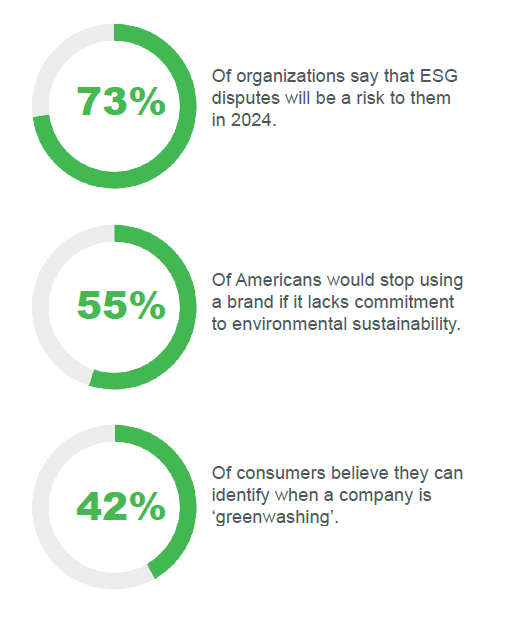Navigating the Greenwashing Paradigm: Taking Action in Corporate Sustainability Communications
 In today's ever-evolving corporate sustainability landscape, businesses face increasing scrutiny and accountability for their environmental claims. The rise of consumer and investor awareness has brought the specter of greenwashing to the forefront—even an unintentional misstep in communication can erode years of hard-earned trust. In this blog, we delve into key takeaways from our Greenwashing Podcast, explore the intersection of sustainability and authentic communication, and provide a roadmap for businesses to articulate their environmental efforts effectively and with integrity.
In today's ever-evolving corporate sustainability landscape, businesses face increasing scrutiny and accountability for their environmental claims. The rise of consumer and investor awareness has brought the specter of greenwashing to the forefront—even an unintentional misstep in communication can erode years of hard-earned trust. In this blog, we delve into key takeaways from our Greenwashing Podcast, explore the intersection of sustainability and authentic communication, and provide a roadmap for businesses to articulate their environmental efforts effectively and with integrity.
Understanding Greenwashing
 Greenwashing is the practice of making misleading or exaggerated claims about a company's environmental efforts and has become a growing concern in recent years. This deceptive practice misleads consumers, undermines investor trust, and can lead to regulatory penalties. High-profile cases across numerous industries have demonstrated the significant financial and reputational damage that companies can face due to misleading environmental claims.
Greenwashing is the practice of making misleading or exaggerated claims about a company's environmental efforts and has become a growing concern in recent years. This deceptive practice misleads consumers, undermines investor trust, and can lead to regulatory penalties. High-profile cases across numerous industries have demonstrated the significant financial and reputational damage that companies can face due to misleading environmental claims.
Recent statistics have shown that 73% of organizations report that ESG disputes will be a risk to them in 2024, according to Backer McKenzie 2024, and 42% of consumers believe they can identify when a company is ‘greenwashing’ and 55% of Americans would stop using a brand if it lacks commitment to environmental sustainability, according to E+E Leader 2024
Avoiding Greenwashing Pitfalls
To navigate the greenwashing paradigm, businesses must anchor their communications in transparency, accuracy, and consistency. This entails making truthful claims supported by data and aligned with recognized reporting frameworks. The approach focuses on transparently communicating both setbacks and successes, ensuring a balanced and honest narrative that captures the entirety of the business's sustainability journey.
The Role of Regulation
As regulations become more stringent globally, companies are compelled to recalibrate their approach to environmental communication. Every aspect of their environmental impact and sustainability efforts is subject to heightened scrutiny, necessitating a comprehensive reassessment of their messaging and reporting practices. This shift requires businesses to not only ensure the accuracy and veracity of their claims but also to align with recognized reporting frameworks and standards to demonstrate their commitment to authentic and transparent communications.
Furthermore, the evolving regulatory landscape demands that businesses stay abreast of the latest developments and best practices in sustainability reporting and disclosure. It also underscores the importance of robust internal processes and controls to substantiate environmental claims, as well as the need for ongoing engagement with regulatory authorities to ensure compliance with emerging requirements.
Strategic Communications Approach
Effective communication of sustainability goals and progress requires a strategic approach. Businesses should refrain from using vague terms like "green" or "eco-friendly" and instead provide specific, data-backed information. This includes aligning with established standards, sharing regular updates on achievements, and being prepared to discuss the challenges encountered along the way.
Collaborative Approach and Technology
Collaboration with supply chain partners is vital in mitigating the risk of greenwashing. Through mutual target setting and thorough due diligence, companies can work to ensure that their sustainability endeavors are not only individual but also integrated throughout their value chain. Leveraging technology and data is another key strategy. Tools like the CDP supply chain program and sustainability software platforms like Schneider Electric’s EcoStruxure™ Resource Advisor enable businesses to track their environmental impact accurately and take informed steps toward decarbonization. These tools particularly help small and medium-sized businesses access the necessary resources to make meaningful progress in sustainability.
Embracing a Sustainable Future through Action
In conclusion, while the threat of greenwashing is real, it should not deter businesses from sharing their sustainability stories. By adhering to the principles of transparency, accuracy, and consistency, companies can avoid greenwashing and instead leverage their communications to inspire and lead sustainability efforts. In this environment, businesses must proactively embrace these regulatory changes, viewing them as opportunities to enhance their sustainability practices, reinforce stakeholder confidence, and contribute meaningfully to the global sustainability agenda. As the corporate world steers towards a more sustainable future, it is those businesses communicating with integrity that will distinguish themselves and make a lasting impact.
For more information contact a communications expert.